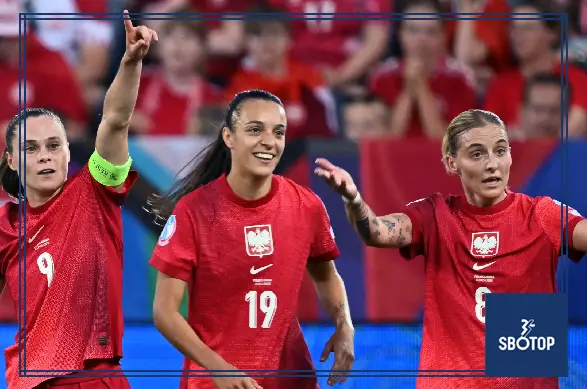In the vast and emotional landscape of international football, moments of individual brilliance often shine brightest when least expected—especially when the stakes are high, and the odds are stacked. In the final group stage match of UEFA Women’s Euro 2025, Natalia Padilla-Bidas wrote her name into Polish football history, scoring a landmark goal in Poland’s 3-2 win over Denmark. Though both nations were mathematically eliminated before kickoff, the clash became a canvas for pride, resilience, and a player’s unforgettable rise.
A Clash of Pride and Redemption
The match at Rotterdam’s De Kuip Stadium was bittersweet by nature. Both Poland and Denmark had lost their first two group games, sealing their early exit from the tournament. However, the final fixture was more than a dead rubber—it was about national pride, restoring dignity, and offering fans one final performance that could inspire belief in future campaigns.
Denmark, semi-finalists in 2017 and runners-up in 2013, were reeling from back-to-back defeats to France and Italy, while Poland, making just their second-ever appearance at the Women’s Euro finals, sought to leave with their heads held high. With young talents like Padilla-Bidas leading the charge, the Poles had plenty to play for—even in the absence of progression.
Padilla-Bidas’ Star Moment
Just 19 years old, Natalia Padilla-Bidas came into the tournament already touted as one of Poland’s most exciting prospects. Having plied her trade in Spain with Sevilla and recently moved to Germany’s Frauen-Bundesliga, she has been on the radar of scouts and fans alike. But few anticipated how impactful she would be on such a major stage, especially in a match shadowed by early elimination.
In the 38th minute, Padilla-Bidas etched her name into Polish football folklore. After picking up a low cross from left-back Karolina Kochanowska just outside the penalty area, she calmly cut inside, left Danish veteran Stine Ballisager stranded, and curled a sublime shot into the top-right corner. The strike gave Poland a 2-1 lead and marked the nation’s first-ever victory in a UEFA Women’s Euro match.
The goal didn’t just change the game’s trajectory—it marked a symbolic shift for a nation hungry for success in the women’s game.
- “I Knew I Had to Take It”
Speaking after the match, Padilla-Bidas was humble yet glowing:
“I saw the space, I felt the moment. I knew I had to take it. We’ve had a tough tournament, but I wanted to give something back to the fans and show the world that Polish football is growing.”
Her goal was replayed across highlight reels, celebrated by fans, and hailed by Polish media as a “moment of gold in a silver campaign.”
Poland’s Journey to the Euros
Poland’s qualification to Euro 2025 itself was a remarkable achievement. Having edged out Austria and the Czech Republic in a dramatic qualifying group, the White and Reds showcased grit and tactical maturity, led by head coach Nina Patalon—the first woman to coach Poland’s senior women’s national team.
Patalon had emphasized development and squad balance throughout the campaign, relying on a mix of youth and experience. The emergence of Padilla-Bidas, along with midfielder Paulina Dudek and goalkeeper Katarzyna Kiedrzynek, formed the spine of a team that was slowly establishing itself among Europe’s growing football nations.
Despite their group-stage exit, Poland’s performances were far from lacking effort. They lost narrowly to France (2-1) and fought valiantly in a 3-2 defeat to Italy, in which they came close to snatching a point.
Denmark’s Decline and Search for Renewal
While Poland celebrated their milestone, Denmark faced introspection. The 2025 edition marked their second consecutive group stage exit following a similar fate in Euro 2022. The Danes came into the tournament with high expectations, spearheaded by star striker Pernille Harder and a core of experienced players. Yet, the cohesion and tactical sharpness were missing.
Against Poland, Denmark showed flashes of their attacking potential. Harder opened the scoring with a 12th-minute penalty and later assisted Signe Bruun’s equalizer in the second half. But defensive lapses and a lack of midfield control allowed Poland to control large spells of the match.
Denmark’s coach Lars Søndergaard, who announced he would step down after the tournament, admitted post-match:
“It’s a hard way to go out. We didn’t achieve our goals, and for that, I take responsibility. The team has potential, but the transition to the next generation must start now.”
The Match in Detail
The final scoreline of 3-2 reflected the open nature of the game. Both teams had little to lose and everything to prove.
- First Half
- 12’ – Penalty for Denmark: Handball by Dudek led to Harder converting from the spot. (1-0)
- 24’ – Equalizer: Poland struck back through Ewa Pajor, who finished off a rapid counter-attack. (1-1)
- 38’ – Padilla-Bidas’ Goal: A curling effort that gave Poland the lead and the moment of the match. (2-1)
- Second Half
- 55’ – Denmark’s response: Signe Bruun powered a header past Kiedrzynek from Harder’s cross. (2-2)
- 77’ – Polish winner: A set-piece goal from captain Natalia Chudzik sealed the win, converting a flick-on from a corner. (3-2)
The remaining minutes saw Denmark pushing for an equalizer, but Poland stood firm—rallying around their backline and goalkeeper to ensure the win.
Polish Reactions A New Chapter Begins
Back home, Polish media lauded the team’s performance. Headlines read: “A Win for the Future”, “Padilla-Bidas Brings Light”, and “Poland Arrives in Europe.” The public sentiment shifted from disappointment at early elimination to pride in the team’s character and promise.
For head coach Nina Patalon, it was a defining moment:
“We may not have advanced, but this win is symbolic. It’s about belief. For the young girls watching back in Poland, this is the kind of performance that makes them dream.”
Padilla-Bidas, at just 19, became the youngest Polish player to score at a major international tournament—a record likely to stand for years.
Denmark’s Soul Searching
The Danes were gracious in defeat but clearly dejected. For a team with stars like Harder, Bruun, and Nadim, the lack of tangible results at two consecutive Euros is a bitter pill to swallow.
Football pundits in Denmark criticized the lack of succession planning and overreliance on aging players. The Danish Football Association (DBU) confirmed they would conduct a full review ahead of their next major tournament qualification cycle.
Still, credit must be given to the effort shown by Denmark in the match. They played with pride, and despite the tournament disappointment, the foundations remain for a rebuild led by younger talents like Emma Snerle and Sofie Svava.
Also Read:










